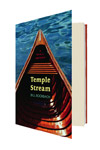Maine can be a scary place to live. Stephen King and Carolyn Chute (author of The Beans of Egypt, Maine) have made this evident to non-Mainers, but I know from experience. I was born in Maine, lived there a full eighteen years before getting out. Fourteen years later, I go back every chance I get.
The Maine described in Bill Roorbach’s new book of nonfiction is also a little scary. Neighbors either come charging in to shout about Thoreau or wonder privately about the “artistic tendencies” of the author and his wife, painter Juliet Karelsen. It’s clear to the residents of Temple that our narrator is from away—Connecticut to be exact—which might as well be Istanbul.
Roorbach wants to chart the exact course of Temple Stream, the waterway that runs through his adopted town, and his chapters progress, alternately, as markers on a map (Upstream One, Upstream Two) and as distinct points on the calendar (Summer Solstice, Autumnal Equinox). Part memoir, part essay collection, part ode, the book is also shaped by the Big Moves in Roorbach’s life—the decision to return East after a tenure-track stint at Ohio State University, the birth of his daughter—which happen in conjunction with his more outdoorsy pursuits.
While genuine in his appreciation of Nature, Roorbach is the antithesis of the smug and self-absorbed Naturalist. He likes his trees and streams, but he prefers his interactions with people; people are messier. When a surly logger named Earl Pomeroy appears to salvage scrap metal from cars rusting on Roorbach’s property, a sharp rivalry ensues. “Professor,” says Pomeroy to Roorbach, without admiration, and Roorbach, ruffled, feels very much like the “summer dink” in “fancy hiking boots” Earl suspects him to be. The Earl thread is well drawn because Roorbach has smart and nonpreachy observations about the Great Divides in Maine and everywhere; Mr. Pomeroy’s antics end up meaning as much to him, and to us, as the turns of the waterway.
There are other Earls: Ms. Bollocks, for one (not her real name), Roorbach’s cagey winter tenant. The book flap refers to an “oddball cast of characters” and Roorbach is an enthused player himself—funny, joyous, incessantly curious. He wants to know the finer points, the Latin names, the reasons why a stream becomes a stream. He consults a hydrologist, a meteorologist, a botanist, a forest ecologist, and remarkably, none of this feels like a lesson...
You have reached your article limit
Sign up for a digital subscription and continue reading all new issues, plus our entire archives, for just $1.50/month.
Already a subscriber? Sign in





